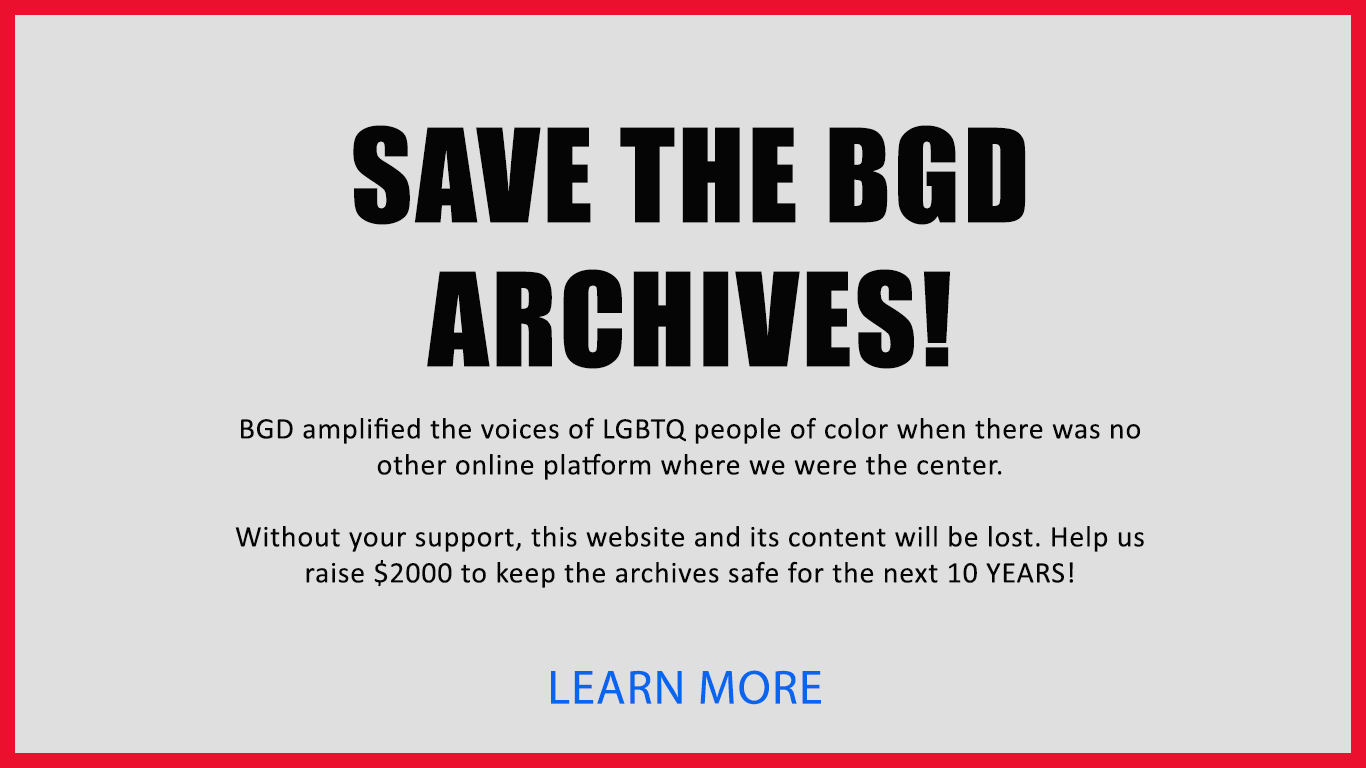by Neesha Powell-Twagirumukiza

[Image description: Protestors, some with faces covered, hold up colorful anti-Trump signs as they face police in riot gear.]
1. Participate in grassroots community and political organizing.
Social change cannot happen without grassroots movements. QTPOC are lucky because we have many peers engaged in revolutionary organizing work right now. There are infinite QTPOC organizers from the present and past to learn from. Find out if there are QTPOC-led organizations in your neck of the woods, and if there’s not, maybe you’re the person to start one. We need all of us on deck to combat the inevitable onslaught of homophobic, racist, sexist and xenophobic legislation in Congress and local and state legislatures.
While our political system is decidedly not working in our favor, we must still seek representation within it to make change. QTPOC require a seat at the table because we are the only ones with our best interests at heart. We have what it takes to win elections in the most conservative of states: Park Cannon, a 24-year-old Black queer woman and Sam Park, a gay 31-year-old son of Korean immigrants, both serve in the Georgia House of Representatives. I dream of more QTPOC candidates emerging over the next four years to champion our rights and center our needs when nobody else will.
BGD is reader-funded and we need YOUR support.
GIVE BACK and help amplify QTPoC voices.
2. Own your labor.
Capitalism has failed oppressed people, mainly because it depends upon exploiting and enslaving vulnerable workers. POC have always created alternative economies in the U.S. to survive because the mainstream economy was never intended to work for us. While collectively-owned businesses are hardly new to our communities, POC have been invisibilized within the modern-day worker cooperative movement. A worker cooperative allows its members (called worker-owners) to collectively own a business sans hierarchy. The vote of each worker-owner counts equally, and decisions are made democratically. Worker co-ops are how we can escape our oppressive workplaces and pursue what we really want to do for a living alongside our friends and community members. Unemployment and underemployment are common amongst us, and we can safely anticipate Trump’s economy excluding us. It’s time to value our precious labor by owning it ourselves. Learn more about worker co-ops here.
3. Develop community-controlled housing.
The rent is too. Damn. High. Although QTPOC create and sustain the culture of several cities, we are rapidly being displaced to suburbs, away from living wage jobs, public transit, social services and community spaces, due to lack of affordable housing. In the coming years, housing specifically for us, by us will be crucial. We should focus on creating permanent solutions to displacement and gentrification, including community ownership. When communities control and/or own land and housing, they are able to keep it out of the hands of greedy developers. Forming community land trusts, which originated in a Black community of farmers, is one way to collectively own land. Starting a housing cooperative, a collectively owned house or building, is another option. Since establishing land trusts and cooperatives is not cheap, we can seek funding from foundations, the government, and grassroots donors with the goal of eventually being self-sustained. As we claim temporary ownership of land, we should honor and practice accountability with the Indigenous communities who truly own the land.
4. Support businesses that support us.
Boycotting and divesting in businesses with hateful practices and values is not easy, especially when unethical companies often have the cheapest prices. We should at least strive towards supporting businesses who believe and behave like our lives matter, especially if they are QTPOC or POC-owned. We have the power to hurt companies destroying our communities, like the many banks invested in constructing the Dakota Access Pipeline on sacred Indigenous land. Some of these banks include Bank of America, Citibank, and Wells Fargo, who are all repeat offenders in violating communities of color. If your bank is invested in the Dakota Access Pipeline or any other terrible thing, consider moving your money to a credit union, a bank that is collectively owned by its members (here’s a list of them state-by-state).
5. Learn and practice transformative justice/community accountability.
QTPOC are some of the most visible leaders in the movement to end police terrorism against Black and Brown lives. It is important in the next four years for us to continue pushing for LGBTQ+ POC to be centered when fighting the prison industrial complex. This is our duty, especially when an alarming 47 percent of Black trans people are incarcerated at some point in their lives. Transformative alternatives to police and prisons designed by our communities would serve us better than being held in cages. To reduce the harm police cause us, we can build safety networks outside of the system to intervene when violence happens in our communities. QTPOC across the country are engaged in transformative justice/community accountability, an approach that allows survivors and community members to define what justice looks like for them free from fear of police. We have a lot to learn from transformative justice practitioners – here’s a resource from Critical Resistance where you can start. QTPOC cannot fully harness our power if we don’t transform how we confront violence in our communities.
 Neesha (she/her, they/them/their) is a Black queer femme writer, dancer, and community organizer originally from the South, currently living in the Pacific Northwest. She enjoys creating, laughing, and traveling with chosen family, her partner, and their cat, Seven. Tweet with her @womanistbae.
Neesha (she/her, they/them/their) is a Black queer femme writer, dancer, and community organizer originally from the South, currently living in the Pacific Northwest. She enjoys creating, laughing, and traveling with chosen family, her partner, and their cat, Seven. Tweet with her @womanistbae.
Do not republish anything from this site without expressed written permission from BGD. For more info, go here.
BUY BGD BOOKS












